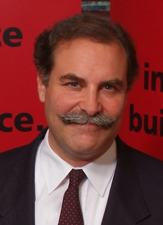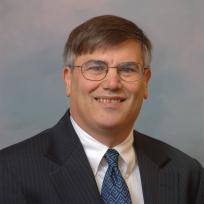 (187x280).jpg)
Charla Rath joined Verizon in January 2010 as Vice President – Wireless Policy Development, where she leads a team engaged in the development of Verizon’s public policy positions on spectrum and other wireless issues. Previously, as Executive Director – Spectrum and Public Policy at Verizon Wireless, Charla worked with the company’s business development and network planning groups to address policy and regulatory issues related to the acquisition of spectrum.
Prior to joining Verizon Wireless, Charla was Vice President – Strategic Affiliations, of NextWave Telecom Inc., where she established a business alliance of small carriers and coordinated advocacy on spectrum auction and financial issues. As Vice President of Freedom Technologies, Inc., a Washington, DC-based telecommunications consulting firm, she advised governments and companies worldwide on a range of telecommunications structural, regulatory and business strategy issues.
Charla also served in the government as advisor to FCC Chairman Alfred C. Sikes on common carrier and spectrum policy issues and as a primary specialist in spectrum and internet policy at the National Telecommunications and Information Administration. Early in her career, she worked in both the United States and Europe on projects related to the impact of information technology on the financial and education sectors.
Charla has an MA in science, technology, and public policy from The George Washington University and a BSFS (Foreign Service) in international economics and finance from Georgetown University.
Keynote: Eric Fournier
.jpg)
Eric Fournier is currently Director for Spectrum Planning and International Affairs in the Agence Nationale des Fréquences (ANFR), the French public agency in charge of spectrum management.
He is Chairman of the Electronic Communication Committee, the CEPT body for harmonisation of spectrum and has been involved in all discussions on major evolution of spectrum in Europe. He was previously Chairman of the CEPT Conference Preparatory Group for the World Radiocommunications Conference 2012 (CPG-12)
In France, he is directly responsible for preparing the revisions of the French national table of spectrum allocation and for coordinating French positions in international meetings on spectrum within ITU, CEPT and EU. He was deputy head of the French delegation for RRC-06, WRC-07 and WRC-12.
He is graduated from Ecole Supérieure d’Electricité (SUPELEC).
Keynote: Dr. Brian Teeple
.jpg)
Dr. Brian S. Teeple, a member of the Senior Executive Service, is the Principal Director to the Deputy Chief Information Officer (DCIO) for Command, Control, Communications and Computers (C4) and Information Infrastructure Capabilities (IIC), Office of the Secretary of Defense (OSD), Chief Information Officer. He provides technical expertise and broad guidance on policy, programmatic and technical issues relating to C4IIC to integrate and synchronize Defense-wide communications and infrastructure programs and efforts to achieve and maintain information dominance for the Department of Defense. He manages efforts defining DoD policies and strategies for design, architecture, interoperability standards, capability development and sustainment of critical C2 and communications for nuclear and non-nuclear strategic strike, integrated missile defense, and Defense and National Leadership Command Capabilities.
He also serves as the primary OSD advocate for the White House Military Office issues related to DoD communications programs and C2 assets. He was responsible for modeling, evaluating and providing recommendations on future sensor systems for the Missile Defense architecture. He was also part of a select team that performed the study for the Senate Armed Services Committee evaluating alternative sensors and platforms including THAAD derived radars, Sea-based XBR, SBIRS Low and the High Altitude Long Endurance EO systems.
Prior to his current assignment, Dr. Teeple was the Director of the Advanced Technology Office in the Advanced Systems and Technology Directorate, NRO. He served as the focal point for all technology development activities across the NRO Tech Enterprise.
Keynote: H Sama Nwana
.jpg)
Keynote: Theodore Sizer

Dr. Theodore (Tod) Sizer is Vice President of the Wireless Research Program in Bell Laboratories. In this role he leads teams in seven worldwide locations innovating in all aspects of wireless systems, technology and software. In addition his teams collaborate with fixed access systems including copper, and optical with special opportunities being explored at the convergence between these and wireless.
Recently he has had significant impact as a key proponent and inventor of the lightRadio™ technology and systems leading to Alcatel-Lucent’s product line solution to address the current Wireless Data explosion.
During his tenure at Bell Labs he has performed research in Wired and Wireless Home Networking, Fixed Wireless Loop systems, Video Watermarking technologies, Optical Computing and Switching Systems, and High Power Laser Design. He was a member of the technical team in Lucent’s role as a promoter in the Bluetooth Special Interest Group (SIG). His responsibilities in the SIG included being Chair of the Coexistence Working Group.
Tod graduated from Amherst College, Magna Cum Laude and received his Masters and Doctorate from the Institute of Optics at the University of Rochester. In 2007 Tod was named a Bell Labs Fellow “For sustained creative contributions to wireless systems, particularly in the convergence of packet and wireless technologies”. He is the author of 43 patents, 16 patents pending and over 50 refereed publications and is a member of the IEEE and OSA.
Keynote: Dean R. Brenner

Mr. Brenner led Qualcomm’s bidding team in spectrum auctions in India (the 2.3 GHz band), the United States (the 700 MHz band), and the United Kingdom (the L Band). In addition, he was responsible for obtaining the regulatory approvals for Qualcomm’s sale of Lower 700 MHz spectrum to AT&T in 2011. In 2006, he obtained the regulatory approvals to launch FLO TV, a mobile TV service. He has spoken at conferences on spectrum policy in the United States, Canada, South Korea, Belgium, Great Britain, and elsewhere around the world. He joined Qualcomm in November 2003.
Mr. Brenner received his A.B. degree, magna cum laude with distinction in public policy studies, from Duke University in 1982. He won a prize for the best paper on communications policy, and he was a recipient for four years of a CBS Scholarship. He received his J.D., cum laude, from Georgetown University in 1985. He is admitted to the Bars of the District of Columbia, Maryland, and the U.S. Supreme Court, the U.S. Courts of Appeal for the D.C., Third, and Eleventh Circuits, and the U.S. District Court for the District of Columbia.
Mr. Brenner is a member of the Federal Advisory Board for Space-Based Positioning, Navigation, & Timing, which advises the Executive Branch on policy matters impacting the Global Positioning System. He is also a member of the Board of Governors of 4G Americas, the Board for Jewish Life at Duke University, and the Board of Trustees of the Field School.
Keynote: Rakesh Taori
Rakesh Taori is a Technical Director with Samsung Research America. Rakesh has over 21 years of work experience. The last 13 years have been in the area of Wireless Communication Systems.
Rakesh started his career with Philips Research Laboratories (Eindhoven, the Netherlands) in 1992, where he designed from scratch, and implemented a complete “natural sounding” parametric speech coding system, called Harmony-1, for very low bit rate storage of speech signals.
Rakesh joined Ericsson in the year 2000. He started his work in the WPAN area (Bluetooth) and designed faster inquiry and co-designed adaptive frequency hopping algorithms for the low rate mode of Bluetooth, both of which were adopted in the standard and used widely. Rakesh’s main contributions were in the area of distributed MAC algorithms.
In 2004, Rakesh joined Samsung Research in Suwon (South Korea) where he contributed towards the development of fundamental architectures and MAC mechanisms for Cellular and WLAN multi-hop systems. Rakesh led Samsung's standardization efforts and significantly contributed to the IEEE 802.16j standards (Industry's first cellular relay standard) and the IEEE 802.11s standard (WLAN mesh). In 2008, Rakesh joined Samsung Electronics in Suwon (South Korea). He led Samsung's 4G standardization efforts in IEEE 802.16m, which was adopted as one of the ITU-endorsed IMT-Advanced systems. Rakesh was the Vice Chair of IEEE 802.16 Working Group.
Since 2011, Rakesh was responsible for Samsung’s R&D effort in the MAC and Access Network area for 5th Generation Cellular Systems and Next Generation WLAN systems. In particular, Rakesh was the key architect for the cloud cell concept comprising user centric virtual cells with cooperating base stations operating in flat network topologies.
Since August 2012, Rakesh is located in Dallas (USA) and is responsible for Samsung’s North American R&D efforts for 5th Generation Cellular Systems, focusing on mm-Wave System Design. His talk today will focus on Vision and Requirements for the 5th Generation Cellular Systems, and the feasibility of mm-Wave as access technology for 5G.
As of today, Rakesh holds 64 US patents.